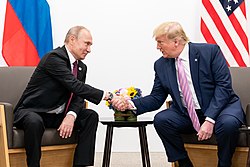The article's lead section may need to be rewritten. (March 2019) |
| Trump–Russia relations |
|---|
 |
| ||
|---|---|---|
|
Business and personal 45th and 47th President of the United States Incumbent Tenure
Impeachments Civil and criminal prosecutions  |
||
Reactions to the Special Counsel investigation of any Russian government efforts to interfere in the 2016 presidential election have been widely varied and have evolved over time. An initial period of bipartisan support and praise for the selection of former FBI director Robert Mueller to lead the Special Counsel investigation gave way to some degree of partisan division over the scope of the investigation, the composition of the investigative teams, and its findings and conclusions.
While initially enjoying bipartisan support,[1] the investigation quickly became the subject of criticism by Trump and his surrogates in the conservative media, with Sean Hannity eventually proposing it was part of a "deep state" conspiracy against Trump.[2] A number of allegations were raised and almost immediately debunked, including misconduct by investigators, supposed unlawful wire-tapping of Trump Tower during the campaign,[3][4] improper unmasking of Trump associates on intelligence intercepts,[5] alleged abuse of Carter Page by the FISA court detailed in the Nunes memo,[6][7] the alleged installation of a mole in the Trump campaign,[8][9][10] and the FBI being denied access to DNC servers for forensic analysis purposes.[11]
- ^ Gingrich, Newt (May 17, 2017). "Robert Mueller is superb choice to be special counsel. His reputation is impeccable for honesty and integrity" – via Twitter.
- ^ "'Deep State' Mueller Has Gone Rogue And Declared War On Trump, Sean Hannity Claims". Newsweek. April 11, 2018.
- ^ Danner, Chas (September 2, 2017). "No Evidence Obama Tapped Trump Tower, Justice Department Confirms in Rebuke of Trump". New York Magazine.
- ^ Cillizza, Chris (September 5, 2017). "Donald Trump just flat-out lied about Trump Tower wiretapping". CNN.
- ^ Dilanian, Ken (April 17, 2017). "Susan Rice Did Nothing Wrong, Say Both Dems and Republicans". NBC News.
- ^ Simpson, Susan (February 6, 2018). "The Nunes memo shows the FBI did not eavesdrop on Trump's campaign". Washington Post.
- ^ Wallance, Gregory J. (February 12, 2018). "Democrats don't need to discredit Nunes memo – The memo does that itself". The Hill.
- ^ Tracy, Abigail (May 25, 2018). "Trump Goes Full Alex Jones as 'Spygate' Falls Apart". Vanity Fair.
- ^ Beauchamp, Zack (May 25, 2018). "'Spygate,' the false allegation that the FBI had a spy in the Trump campaign, explained". Vox.
- ^ Killough, Ashley; Raju, Manu; Herb, Jeremy (June 6, 2018). "Top Republicans break with Trump, say FBI acted appropriately". CNN.
- ^ Rid, Thomas (July 17, 2018). "What Mueller Knows About the DNC Hack—And Trump Doesn't". Politico.
CrowdStrike, the company the DNC brought in to initially investigate and remediate the hack, actually shared images of the DNC servers with the FBI. For the purposes of an investigation of this type, images are much more useful than handing over metal and hardware, because they are bit-by-bit copies of a crime scene taken while the crime was going on.


